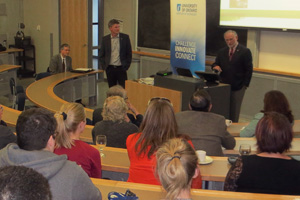Leading ecotoxicologist presents 2014 Romanowski Lecture at UOIT
September 26, 2014

Faculty, staff, students and community members gathered at the University of Ontario Institute of Technology (UOIT) on September 17 to hear Dr. John Giesy, one of Canada’s leading ecotoxicologists, tell the story of how he discovered a harmful chemical in the environment – and ultimately had it banned from further use.
“The University of Ontario Institute of Technology was pleased to have Dr. Giesy visit us, engage with our undergraduate and graduate students and share his fascinating story,” said Dr. Michael Owen, UOIT Vice-President, Research, Innovation and International. “He has done an incredible service to society, helping prevent what could have been a global catastrophe through his meticulous research. We thank the Royal Society of Canada for this opportunity to hear from a top environmental researcher here on our campus.”
Dr. Giesy, Professor and Canada Research Chair in Environmental Toxicology at the University of Saskatchewan, was the featured speaker for the 2014 Romanowski Lecture Series, which informs Canadians of recent advances in research and technology in the environmental sciences based on the lecturer’s particular knowledge and expertise. In his lecture, entitled Toxicological Evaluation of Perfluorooctane (PFOS) in the Environment: Anatomy of an Environmental Issue, he described how he applied state-of-the-art chemical methods of mass spectrometry and molecular biology to determine the level of PFOS concentrations in the environment and its threshold of toxicity (how much of a substance has to accumulate in your body before you start seeing toxic symptoms).
Today, PFOS is recognized as a toxic, man-made chemical. But when 3M first started manufacturing it in the 1950s, nobody knew the extent of environmental harm it could cause. The chemical was lauded for its liquid-repellant and fire-resistant properties, making it an invaluable ingredient in compounds used for creating products such as:
- fabric protectors
- fire-fighting foams
- household and industrial cleaning products
- hydraulic fluids for commercial aviation
- microchips
- microwave popcorn bags and fast-food hamburger wrappers
- stain, oil and water repellents
But this usefulness was tempered by a big trade-off: PFOS is persistent, meaning that if it enters the tissues of humans or animal species, it will accumulate for generations, potentially posing a risk to human health and the environment over the long term.
Scientists did not initially fully understand the chemistry and toxicology of PFOS and assumed it would not move in the environment or accumulate in animal tissues. Data from animal studies suggest that not only has PFOS entered the environment and contaminated the blood of people and wildlife, but also that repeated exposure of sufficient amounts in can lead to stomach upset, liver damage and effects on thyroid hormone levels, among other health complications. According to Dr. Giesy’s research, it also promotes cancer by interfering with the body’s ability to repair DNA damage.
In 1997, Dr. Giesy’s research team discovered what they suspected was PFOS in eagles’ blood. After approaching 3M and receiving a grant from the company to conduct further studies, Dr. Giesy’s team collected blood samples from many different species and analyzed the samples using new accurate and sensitive methods. The team discovered PFOS in animals from around the world, from polar bears and seals in the Arctic to fish in the Great Lakes. Through a series of controlled laboratory studies they determined the toxicity to wildlife and measured the concentration of PFOS in a range of ecosystems to compare it to the threshold concentrations they had determined. They put together a risk assessment and reported their results to 3M and regulators.
As a result of this research, 3M decided to phase out the production of PFOS-related compounds starting in 2000. In 2009 PFOS and other chemicals that degrade to PFOS were included in Appendix B of the Stockholm Convention on Persistent Organic Pollutants, a global treaty to protect human health and the environment from chemicals that remain intact in the environment for long periods. In addition, 87 chemicals that degrade to PFOS are now banned in Canada. Concentrations of PFOS in the environment are declining.
A Fellow of the Royal Society of Canada (RSC), Dr. Giesy was recognized for his research with the 2013 Miroslaw Romanowski Medal, which is awarded each year for significant contributions to the resolution of scientific aspects of environmental problems or for important improvements to the quality of an ecosystem in all aspects - terrestrial, atmospheric and aqueous - brought about by scientific means. The Romanwski Lecture Series is delivered annually by the recipient of the Miroslaw Romanowski Medal.
At the lecture UOIT also announced that Dr. Isabel Pedersen, Tier 2 Canada Research Chair (CRC) in Digital Life, Media and Culture, was named one of the inaugural 91 members of the RSC’s College of New Scholars, Artists and Scientists.
UOIT, Trent University and University of Toronto Scarborough were co-sponsors of this event.



